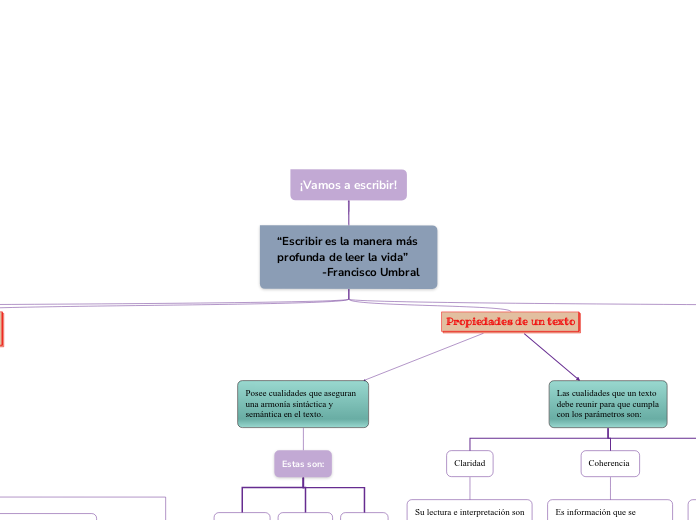作者:RUTH MARINA CARRION GONZALEZ 2 年以前
225
¡Vamos a escribir!

作者:RUTH MARINA CARRION GONZALEZ 2 年以前
225

更多类似内容
Type in the name of the multiple-perspectives text.
Example: Bridge to Terabithia by Katherine Paterson
Identify an important issue from the text that is being presented from different angles. Type it in.
Example: Jesse's drawing talent.
Decide on the fourth point of view
Type in the name of the last character whose perspective on the issue you are going to present.
Example: Leslie Burke, Jesse's new next-door neighbor, and best friend.
Concretar el asunto
Investigar en fuentes confiables referentes al asunto
Seleccionar la información, datos, porcentajes, argumentos de autoridad acerca del tema
Jerarquizar las ideas
Realizar un esquema que oriente la redacción
Distribuir las ideas de acuerdo con la estructura del texto. (Introducción, desarrollo y conclusión).
Redactar un primer borrador
Repasar y recordar las características de cada tipo de párrafo para elegir con cuál de ellos iniciar
Situación Comunicativa:
Acto de Comunicación:Es el proceso de intercambio de informacion entre el emisor y el receptor, teniendo en cuenta el entorno y los elementos que influyen en la comprensión del mensaje.
Entorno de Comunicación: Es el contexto o ambiente donde se lleva a cabo la comunicación, considerando factores como el lugar, el tiempo, la cultura y el propósito del mensaje.
Fases de un Escrito
Conclusión
Desarrollo
Introducción
Investigar, leer y seleccionar:
Investigar: Recopilar información relevante sobre el tema.
Leer: Comprender y analizar fuentes para obtener conocimiento.
Seleccionar: Elegir la información más adecuada y valiosa.
Tema, Objetivo, Audiencia:
Tema (Qué)
Objetivo (Para quién)
Audiencia (Para qué)
Point of view
Type in a relevant quote that highlights the character's point of view. Try to follow a citation format: author's name, chapter, and page.
Example: I can't get the poetry of the trees,' he said. She nodded. Don't worry,' she said. You will someday. He believed her.' (Paterson, 4. 24)
Recomendaciones para redactar desde párrafos hasta ensayos.
How is the viewpoint introduced in the story?
Choose an answer:
Énfasis en la comprensión del mensaje a través de la consideración del emisor y el receptor.
Instrucciones sobre cómo adquirir información de diversas fuentes para enriquecer la escritura.
Pautas y cualidades necesarias para redactar de manera efectiva.
Relación entre la comprensión del mensaje y la aplicación de las recomendaciones para la redacción.
Whose character does the third point of view belong to?
Type in his/her name.
Example: Mr. Aarons, Jesse's father.
Comprension
Son necesarias para la comprensión lectora.: La decodificación, la fluidez y el vocabulario.
Coherencia
Es información que se encarga de organizar la estructura comunicativa del texto (título, índice, introducción, prólogo, capítulos, apéndices, conclusiones, referencias…)
Claridad
Su lectura e interpretación son sencillas y el lector no requiere de hacer un gran esfuerzo para captarlos y decodificarlos.
What does the character think, say or do that suggests their perspective on the issue?
Type in a quote and try to maintain the citation format.
Example: 'He would like to show his drawings to his dad, but he didn't dare. (...) He'd thought his dad would be pleased. He wasn't. What are they teaching in that damn school? he had asked.' (Paterson, 2.8)
Estas son:
cohesión
coherencia
adecuación
What kind of narration introduces the viewpoint?
Choose an answer:
Decide on the second point of view
Name the character (it can either be the main character or one of the supporting characters) whose point of view you are presenting.
Example: Miss Edmunds, Jesse's music teacher.
Type in a quote that points out the character's position about the issue.
Try to follow a citation format: author's name, chapter, and page.
Example: 'She said he was unusually talented, and she hoped he wouldn't let anything discourage him.' (Paterson, 2. 8)
— Claridad — Propósito. — Para quién.
How is the viewpoint introduced in the story?
Choose an answer:
La Corrección
Muchos profesores han evolucionado en la aplicación de técnicas que se basan en la corrección
Hace al estudiante responsable de su propio aprendizaje.
Es eficaz, como cuando se utiliza la enseñanza como parte del proceso de composición.
Pasos que se siguen durante el proceso de escribir un texto:
Estas también son algunas de las fases internas de la redacción.
Revisión del producto final.
Proceso de la escritura.
Organización de ideas
Generación de ideas
Decide on the first point of view you are going to present.
Type in the name of the character (it can either be the main character or one of the supporting characters) whose point of view belongs to.
Example: Jesse Oliver Aarons, Jr., the main character of the novel, a fifth-grader living in a rural Southern area.
3.¿Para quién?, ¿cuál será la audiencia de esta lectura (en otras palabras, a quién o a quiénes está dirigido este texto).e este texto?
2.¿Para qué o cuál habrá sido el objetivo que motivó la escritura de este texto?
1.¿De qué trata este artículo? La respuesta debe ser muy puntual (en seis palabras mencionar lo medular).
Type in a relevant quote that highlights the character's point of view towards
“Escribir es la manera más profunda de leer la vida” -Francisco Umbral.
Try following a citation format: author's name, chapter, and page.
Example: 'Jesse drew the way some people drank whiskey. (...) Lord, he loved to draw. (...) When he was in first grade, he told his father that he wanted to be an artist when he grew up.' (Paterson, 2. 7)
Recomendar y orientar sobre cómo se organiza un texto, por lo que se considera el tema, el propósito y la audiencia, así como la lectura y la investigación para mejorar la escritura.
What type of narration introduces the viewpoint?
Choose an answer:
¿cómo iniciar?
la audiencia a la que va dirigida la tarea (¿para quién?).
El objetivo o propósito que motiva el escrito (¿para qué?)
el tema o asunto (¿qué?)